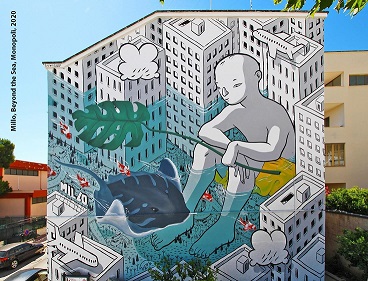Doing Research in an Enchanted World: Lessons from Indigenous Methodologies
DOI:
https://doi.org/10.54103/2035-7680/18680Parole chiave:
indigenous Amazonia; indigenous methodologies; indigenous epistemologies; decolonizing ethnographic research; bodily knowledge; participatory researchAbstract
Based on prolonged apprenticeship with the indigenous Gente de Centro from Colombian Amazonia, this article discusses their research methodologies and the challenges they pose to ethnographic knowledge. Indigenous methodologies suggest that the modern disenchanted method, with its semi-structured interviews, focus groups, and data collection design, is inadequate to account for a world in which everything speaks and does so unexpectedly. Moreover, indigenous people’s warning to watch over the effects of knowledge means assuming responsibility towards the world that the act of knowing produces or could produce. In doing so, they underline the inseparability of epistemological, ethical, and political dimensions of research. Anthropology must respond adequately to such challenges if it is to contribute to indigenous cultural and political struggles and remain a credible approach to understanding the world. To do so, it must work against method as a data-gathering technique, and let itself be occupied by the cognitive practices of others.
Downloads
Riferimenti bibliografici
Deloria, Vine Jr. Spirit and Reason. The Vine Deloria Jr. Reader. Fulcrum Publishing, 1999.
Fabian, Joannes. “Ethnographic Misunderstanding and the Perils of Context.” American Anthropologist, vol. 97, no. 1, 1995, pp. 41-50. DOI: https://doi.org/10.1525/aa.1995.97.1.02a00080
Griffiths, Thomas. “Finding One’s Body: Relationships between Cosmology and Work in North-West Amazonia.” Beyond the Visible and the Material: The Amerindianization of Society in the Work of Peter Rivière, edited by Laura Rival and Neil L. Whitehead, Oxford University Press, 2002, pp. 247-262.
Hester, Lee, and Jim Cheney. “Truth and Native American Epistemology.” Social Epistemology, 15, 2001, pp. 319-334. DOI: https://doi.org/10.1080/02691720110093333
Ingold, Tim. “That’s Enough About Ethnography!.” Hau: Journal of Ethnographic Theory, vol. 4, no. 1, 2014, pp. 383–395. DOI: https://doi.org/10.14318/hau4.1.021
---. “Knowing from the Inside.” Project Overview, retrieved from University of Aberdeen. https://www.abdn.ac.uk/research/kfi/about/. Accessed 20 Dec. 2021.
Jifichíu, Nejedeka, and Célimo Ramón. Cultivando la ciencia del árbol de la salud: conocimiento tradicional para el buen vivir. Editorial Pontificia Universidad Javeriana, 2019. https://repository.javeriana.edu.co/handle/10554/47281. Accessed 20 Dec. 2021.
Kovach, Margaret. Indigenous methodologies: Characteristics, conversations, and contexts. UT Press, 2009.
Lave, Jean, and Etienne Wenger. Situated Learning: Legitimate Peripheral Participation. Cambridge University Press, 1991. DOI: https://doi.org/10.1017/CBO9780511815355
Louis, Renee Pualani. “Can You Hear Us Now? Voices from the Margin: Using Indigenous Methodologies in Geographic Research.” Geographical Research, vol. 45, no. 2, 2007, pp. 130–139. DOI: https://doi.org/10.1111/j.1745-5871.2007.00443.x
Maturana, Humberto, and Francisco Varela. The Tree of Knowledge. The Biological Roots of Human Understanding. Shambhala, 1984.
Micarelli, Giovanna. “Divine Banknote: The Translation of Project Money into Public Wealth.” Images of Public Wealth: The Anatomy of Wellbeing in Native Amazonia, edited by Fernando Santos-Granero. University of Arizona Press, 2015, pp. 161-187.
---. Indigenous Networks at the Margins of Development. Editorial Universidad Javeriana, 2015.
---. “Finding the Taste of Knowledge: The Orphan in Indigenous Epistemologies.” Tipití: Journal of the Society for the Anthropology of Lowland South America, vol. 13, no. 2 (6). Special Topic: The Alchemical Person, 2015.
---. “Investigar en un mundo encantado: los aportes de las metodologías indígenas al quehacer etnográfico.” Universitas Humanística, 86, 2018, pp. 219-245. DOI: https://doi.org/10.11144/Javeriana.uh86.imei
Molano B., Alfredo. “La gente no habla en conceptos, a menos que quiera esconderse.” Revista Anthropos: Huellas del Conocimiento, no. 230, 2011, pp. 101-106.
Ochs, Elinor, and Lisa Capps. “Narrating the Self.” Annual Review of Anthropology, 25, 1996, pp. 19-43. DOI: https://doi.org/10.1146/annurev.anthro.25.1.19
Santos, Boaventura de Sousa. “Beyond Abyssal Thinking: From Global Lines to Ecologies of Knowledges.” Review, vol. 30, no. 1, 2007, pp. 45-89.
Santos-Granero, Fernando. “Beinghood and People-Making in Native Amazonia: A Constructional Approach with a Perspectival Coda.” HAU-Journal of Ethnographic Theory, vol. 2, no. 1, 2012, pp. 181-211. DOI: https://doi.org/10.14318/hau2.1.010
Shawn, Wilson. “What is indigenous research methodology?” Canadian Journal of Native Education, vol. 25, no. 2, 2001. pp. 175-179.
Smith, Linda Tuhiwai. Decolonizing Methodologies: Research and Indigenous Peoples. Zed Books, 1999.
Varela, Francisco, et al. The Embodied Mind. MIT Press, 1991. DOI: https://doi.org/10.7551/mitpress/6730.001.0001
Viveiros de Castro, Eduardo. “A fabricação do corpo na sociedade xinguana.” Sociedades indígenas e indigenismo no Brasil, edited by João Pacheco de Oliveira Filho, Marco Zero; UFRJ, 1987, pp. 31-41.
---. Metafísicas Caníbales: Líneas de Antropología Postestructural. Conocimiento, 2010.
Weber, Max. “Science as a Vocation.” From Max Weber: Essays in Sociology. Translated, edited and with an introduction by Hans. H. Gerth and C. Wright Mills, Routledge,1948, pp. 129-156.
White, Harrison C. “Strategies and Identities by Mobilization Context.” Center on Organizational Innovation. Columbia University, Working Papers, Sept. 2002. DOI: https://doi.org/10.1515/sosys-2002-0208
Dowloads
Pubblicato
Come citare
Fascicolo
Sezione
Licenza

Questo articolo è soggetto a licenza Creative Commons Attribution-NonCommercial-NoDerivatives 3.0 International License.




